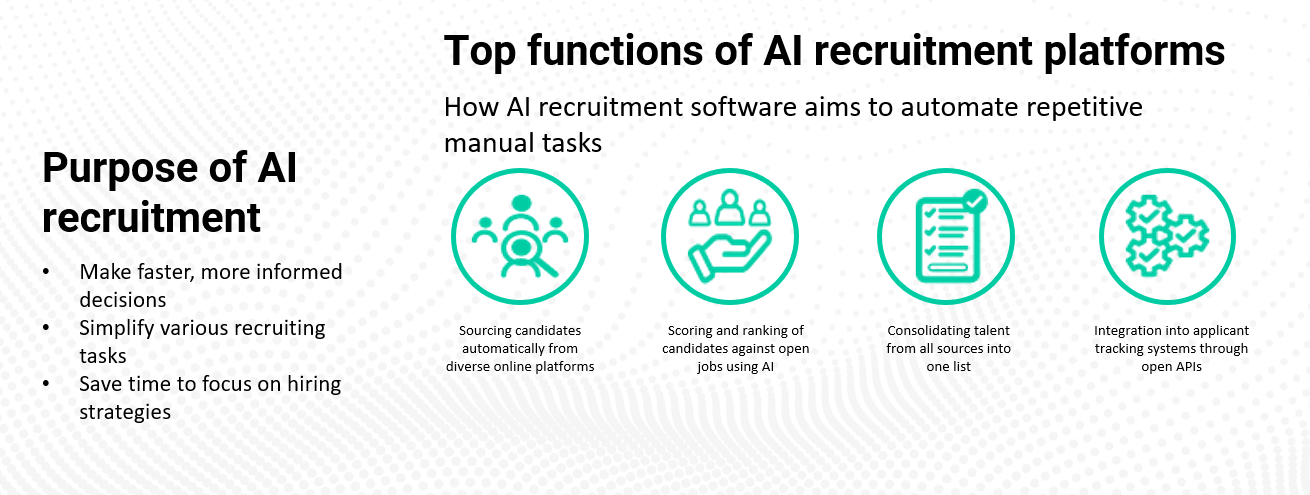AI recruitment guide: All HRs need to know about AI in recruiting

AI sourcing tools are now mainstream in the HR and recruitment landscape. And it is not only the big-tech players who rely on AI sourcing today.
Reports by the HR Research Institute indicate that 96% of HR managers already feel that AI has immense future potential in terms of acquiring suitable talent, while 55% of them feel that it will ultimately become a regular component of the process of recruitment within five years [1]. Reports also indicate how companies in almost every business segment are scaling up their investments in HR and recruiting software, with 9 out of 10 worldwide entities already using AI for HR needs in one way or another [2]. At the same time, 63% of professionals engaged in talent acquisition have stated how AI has completely revolutionized their organizational recruitment playbooks [3].
AI has already transformed the day-to-day duties of a recruitment manager, and with immense competition to recruit the best talent, companies need suitable recruiting software and other recruitment tools to stay reasonably competitive in the current scenario.
In this guide, we are going to cover the nuances of AI-based recruiting, how it helps companies, salient features, and its implementation basics. We will also delve into how to choose an AI recruitment tool to help you make an informed decision.
What is AI recruitment?
AI recruitment means deploying artificial intelligence throughout the recruitment process. This includes automatic candidate screening, assessments, and communication management. AI can streamline, automate, and simplify various aspects of the recruitment blueprint, process, and workflow. This helps HR managers to focus on more efficient hiring and relationship-building.
There are huge opportunities and benefits to adopting AI sourcing tools and other recruitment applications, as these recruitment tools help companies hire skilled candidates at speed and scale while eliminating human biases. But before we explore ways AI can help in recruitment, let’s see how such solutions work.
There are numerous recruiting software solutions and other AI sourcing platforms that are available today.
How does an AI recruitment platform work?
These platforms typically have the following features to help recruiters offload tasks:
- Sourcing candidates automatically from diverse online platforms
- Scoring and ranking of candidates against open jobs using AI
- Consolidating talent from all sources into one list
- AI-based and automated interactions and messaging, including chatbot
- Automated scheduling and screening of candidates
- Integration into applicant tracking systems (ATS) through open APIs
In general, AI recruitment software aims to automate repetitive manual tasks and also help make faster, more informed decisions where a great amount of data is involved. But there’s more to it than automation and simplification of various tasks.
Let’s now learn more about how AI sourcing tools and similar AI-based recruitment tools are revolutionizing recruitment procedures.
How is AI revolutionizing the recruitment process?
Experts believe the future of recruitment lies in Augmented Intelligence, a collaborative approach where AI enhances, rather than replaces, human decision-making. While machines can’t fully replicate human intuition or empathy, they can significantly amplify efficiency, accuracy, and scale.
AI-powered recruitment tools are already transforming recruiting by automating repetitive tasks and enabling data-driven decision-making. Here’s how AI is reshaping the process:
- Time for Strategy, Not Admin: By automating time-consuming tasks like resume screening, interview scheduling, and initial outreach, recruiters can focus more on strategic initiatives, candidate engagement, and employer branding.
-
Smarter Sourcing: AI can identify and source candidates across multiple platforms, expanding reach and improving match accuracy.
-
Intelligent Job Matching: Algorithms now automate job-to-talent matching, optimizing placements based on skill fit, experience, and predicted performance.
-
Seamless Multichannel Engagement: AI facilitates consistent, timely communication with candidates across email, SMS, and chat—without losing the human touch.
-
Reducing Bias and Personalizing at Scale: AI can help minimize unconscious bias in screening and tailor recruitment strategies based on organizational goals, something previously difficult to achieve manually.
Suggested Read – Talent Intelligence + AI Tools: Redefining Healthcare Recruiting
Various Ways to Implement AI in Recruiting
Now that we understand the basics and benefits of AI Recruiting, let’s review how to implement AI in the recruitment process.
Here are some major ways in which AI recruitment tools can be implemented at various stages of the recruitment process:

Automation
Automated candidate sourcing, resume screening, interviews, scheduling, and communication save the bulk of HR managers’ time, freeing them up to focus on other meaningful jobs. AI recruiting solutions, such as Leoforce, employ advanced search and match capabilities to enhance the quality of candidates, thereby offering a swift progression through the recruiting funnel. This not only expedites the time-to-source but also significantly reduces the time-to-hire.
Personalization
Hire quality is better with AI, making it easier to leverage available data for actionable insights while helping companies match candidates to specific keywords, requirements, and other job requirements. AI enables personalized flows for candidates with dynamic communication, job recommendations, similar openings, locations, and more. For recruiters, AI enables a personalized candidate pipeline with matching compatibility and abilities for roles.
Data Insights
Data Insights generated by AI recruitment solutions help devise strategies faster, hire better, and find suitable talent quicker. Companies can tap into recommendations, understand candidate personas, get pipeline trends, and rediscover qualified and existing candidates in the pipeline with insights from solutions like Talent Rediscovery from Leoforce.
Bias Control
AI can remove human biases in the hiring procedure. This is vital for organizational commitments toward diversity and inclusion. Scoring candidates based on organizational aspects takes their experience, skills, and other attributes into account without the risk of human-bias keeping top candidates from succeeding in the recruitment process.
Types of AI Recruiting Tools
No one size fits all when we talk of AI-based recruitment tools. Below, we explore the same:
Intelligent screening
Intelligent screening solutions automate the resume-screening process via AI and deploy AI within existing company databases. The software keeps learning about candidate movements, types, and successful and unsuccessful employees based on their tenure, performance, and turnover rates, and learn about current employees’ existing skills, experience, and other attributes. These insights are then deployed for finding new applicants, grading, and shortlisting the best ones.
These solutions may also tap into public sources of data about candidates’ earlier employers, social media profiles, and more. Intelligent screening solutions integrate with company ATS (applicant tracking systems) while keeping the workflow intact.
Personalized communication
Conversational AI solutions help personalize communication with potential candidates to enhance their overall experience. AI can create automated messaging, recommendations, dynamic content, and other personalized conversations via Chatbots. Natural language processing and understanding are used for gauging candidate questions and intentions.
Configurable Chatbot
Chatbots are steadily becoming indispensable for recruiters, ensuring interactions with candidates occur in real time and can be personalized per company requirements. Chatbots can contribute towards superior candidate experiences with prompt responses after applications and consistent engagement.
Digitized interviews
Software solutions are now enabling AI-based video interviews and other skills assessments. With AI, digitized interviews can be analyzed for speech patterns, words, and expressions to gauge the candidate’s suitability for the company and work culture.
Suggested Read – Four things to look for in an AI recruiting tool
How does AI help diversity and inclusion?
Diversity, Equity, and Inclusion are now major priorities for companies. The need to build a bias-free workplace with equal representation across communities is growing stronger by the day. With AI-backed scoring and screening systems, companies can eliminate human biases and create a fair and transparent recruitment procedure, based only on the merits, skills, and aptitudes of candidates.
Leoforce assists your organization in achieving DEI goals while also serving as a comprehensive AI hiring tool. Leoforce’s unique capabilities lie in its ability to consolidate diverse candidates from multiple sources into a single comprehensive list. The tool is adept at sourcing more diverse talent, enhancing the organization’s ability to achieve its diversity hiring objectives effectively.
How AI recruiting tools are changing an HR manager’s role?
HR managers can now strategize better with data-based actionable insights and pipeline trends generated by AI. They no longer have to spend time on communication, scheduling, sourcing, and other administrative tasks. Here are three ways in which their roles have transformed-
More efficient
As AI gives hiring managers insights and suitable time for deploying hiring mechanisms.
Better relationships
HR managers now have more time to focus on building relationships with candidates who are the best fit, determining whether they are suitable for the organization or not. This also enhances the candidate experience by a great deal.
Syncing with hiring managers
Recruiters now use AI-backed KPIs and other visuals, including quality of hire, for syncing with their hiring managers and other personnel with regard to desired outcomes.
What are the challenges of AI recruitment tools?
Despite the significant benefits of leveraging AI recruitment tools, there are still challenges that must be considered when evaluating their use or selection.
Bulk data requirement
AI will always need data in ginormous amounts in order to successfully understand and replicate human intelligence. AI backed by machine learning will require sizable data for learning how to assess, and screen resumes. In addition, the quality of data would also matter as to direct the AI in the right direction.
Eliminating human bias
AI may be able to help lower bias throughout the recruitment mechanism. However, it may end up learning about human biases as well. While algorithms may extract patterns and insights from huge data sets for making predictions on the basis of these analyses, it may also be vulnerable to any earlier biases.
Slow adoption of technology
HR managers, professionals, or other organizational leaders may be slow to adiot AI tools and solutions. Teams may need training on the ethical use of AI and management may need assistance in understanding the potential positive financial implications of using AI.
Takeaways
HR managers are realizing the importance of using AI-based recruitment tools. Better recruiting is synonymous with AI-based tools which help streamline repetitive and administrative tasks, freeing up managers to focus on relationship-building. AI can help companies reach DEI goals while eliminating biases in the hiring process. The tools ensure quicker sourcing of candidates with automatic scheduling and appointments. Real-time communication via chatbots also improves candidate engagement. From personalization to cost savings, AI recruiting is the way to go.
Solutions like Leoforce are revolutionizing the dynamics of recruiting, enabling HR teams to take care of sourcing from 50+ channels and automating engagement via personalized chatbots. It also streamlines and simplifies the entire process from live assessments to screening and adhering to diversity, legal and other compliances.
FAQs
What is AI recruiting software?
AI recruiting software is an artificial intelligence-backed tool which automates various repetitive tasks in the recruitment procedure, including appointment scheduling, communication, sourcing, and more.
What is AI in recruitment?
AI in recruitment means the deployment of artificial intelligence throughout the recruitment procedure to help HR managers and teams save time and money while cutting down on the time-to-hire and sourcing better candidates.
Is Artificial Intelligence and Machine Learning the same in recruitment tools?
AI in recruiting is how artificial intelligence is deployed for the procedure of talent acquisition. Machine learning is how the system learns to narrow down your preferred candidates while automating jobs throughout the process of recruitment.
Is AI good for recruitment?
AI-based recruiting tools can help companies save time and money significantly. They can eliminate hiring biases while freeing up managers to focus on more vital tasks instead of repetitive administrative jobs.
Which companies use AI in recruitment?
Many companies use AI for recruitment worldwide, including leading names like Oracle, PwC, Unilever, Vodafone, and others.
How does AI Improve HR?
AI takes away lengthy tasks from HR, such as candidate sourcing, communication, assessments, and the like. This means that HR has more time to concentrate on bigger and more effective tasks.
Why use AI recruiting platforms?
These platforms help source better candidates and contribute towards a faster hiring process. They also enable quicker assessments, screening, short-listing, and automating engagement and communication with candidates.
Will AI replace recruiters?
AI will not replace human recruiters. It will only make their lives simpler by automating various tasks and enabling more efficient decision-making.
Does using AI tools increase or decrease the quality of selection procedures?
AI tools speed up the hiring procedure, but there are no compromises on the selection quality since all company parameters, specifications, and needs are considered.
Resources
[1] https://www.linkedin.com/pulse/2021-hiring-trends-automation-artificial-jessica-delaney/
[2] https://www.google.com/url?q=https://www.shrm.org/resourcesandtools/hr-topics/global-hr/pages/employers-embrace-artificial-intelligence-for-hr.aspx
[3] https://www.kornferry.com/about-us/press/korn-ferry-global-survey-artificial-intelligence-reshaping-the-role-of-the-recruiter


